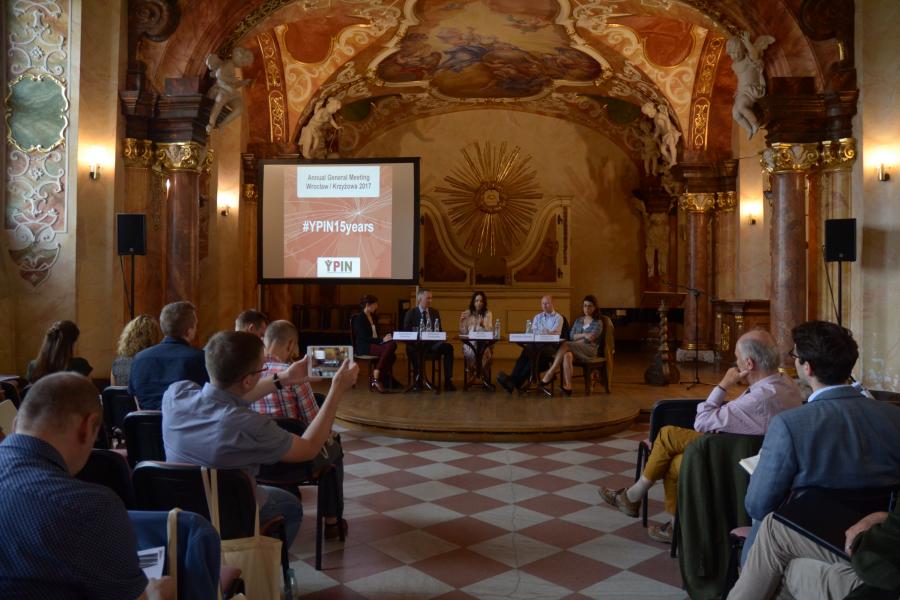How does the younger generation of experts in the EU see the current state of the Union and its future? A report from a panel discussion at the University of Wrocław, Poland
The largest political turmoil in the history of the Union and its causes
“There are people who live somewhere and people who live anywhere,” said Miriam Lexmann, Director of the EU Regional Programmes at the International Republican Institute. This distinction, which Lexmann borrows from David Goodhart’s recent book The Road to Somewhere, offers some form of explanation for Brexit and, more generally, the rise of nationalism and populism all over the world.
“The majority of people, including those living in the UK, have never moved away from the part of the country where they were born. At the same time, there is an increasing number of people who are able to live anywhere, see the world from their perspective and shape it according to their understanding,” added Lexmann. Accordingly, Brexit might be understood as a revolt of the “settlers” against the emerging elite class of global cosmopolitan nomads.
The appearance of these elites goes hand in hand with that of poor mobile migrants. The British vote to abandon the project of European unification, as both an aspect of and an answer to globalisation, cannot be understood without addressing the dual nature of increased mobility and rootlessness—perhaps, the most striking feature of globalisation. The end of history, proclaimed by Francis Fukuyama in the 1990s, thus seems to be a much more dynamic phenomenon than one would expect.
According to Lexmann, Fukuyama is largely misunderstood: “He did not claim that the end of history would mean a global triumph of liberal democracy; he was actually describing a certain decline of democracy. If the trends he observed were to continue, idealism, courage and imagination would be replaced by economic calculation and the endless solving of purely technical problems.”
The original meaning of the words ‘democracy’ and ‘solidarity’ is often lost in technical implementations.
For Lexmann, Brussels’ contemporary decision-makers embody that kind of technocratic governance. It is not limited, however, to the institutions of the EU but has spread to all levels of political decision-making. “The original meaning of the words ‘democracy’ and ‘solidarity’ is often lost in technical implementations. A colleague of mine looked into the social situation of some of the young men behind the terrorist attacks in Paris and Brussels. They were often unable to find a job and lived on state benefits. While thus benefiting financially from the state’s solidarity system, they eventually turned against this solidarity, since it was empty at its core,” Lexmann added.
Brexit and the question of sovereignty
The issue of immigration played a major role in the Brexit referendum campaign. “But it wasn’t simply about immigration,” said Christian Davies, Warsaw correspondent for The Guardian. “The surge in the Leave vote was created just about a month before the vote, when the Leave campaign played on linking immigration with the idea of regaining sovereignty.”
According to Davies, there had been no honest conversation in the UK on what the decision to leave the EU would really entail, which left public opinion demanding the impossible: both the regaining of sovereignty and the maintenance of current levels of economic growth. “Even within the British government, including in some very high circles,” said Davies, “people still hope that Britain could restrict the freedom of movement while remaining in a single market of one kind or another — the most unlikely scenario to happen.”
“People now begin to see what sovereignty really means,” he added. Philip Stephens from the Financial Times once called perfect sovereignty a mirage: “Think of a man walking alone in a desert — this person is entirely sovereign in the decisions he takes and yet entirely powerless.” This seems particularly true in the age of globalisation.
Although it will be politically impossible not to leave the EU, it may also be technically impossible to implement the leaving.
But the problem goes far beyond dashing hopes. For Davies, the referendum vote was fair and the result clear: “Even the people who didn’t vote to leave say that we have to leave in one form or another. The problem is that although it will be politically impossible not to leave the EU, it may also be technically impossible to implement the leaving.”
Theresa May’s government, now based on a weakened coalition, will be facing the 27 remaining EU countries, who despite their differences, were able to put together a single, united front. “The negotiations are not simply about going to Brussels and coming back with a deal,” said Davies. “Hundreds of bills will need to be passed in the House of Commons to transfer EU legislation into domestic law, and a government propped up by a minor regional party might not have the necessary majority to do that.”

The panelists: Katarzyna Sobieraj, Wojciech Przybylski, Miriam Lexmann, Christian Davies, Natacha Fauillimmel (Photo: Daniel Tkatch)
Davies also warned that instead of officially leaving the single market, the customs union and the jurisdiction of the European Court of Justice (ECJ), as would be the case in a so-called hard Brexit, Britain is facing the very real possibility that negotiations will fail altogether, resulting in no exit agreement — “a cliff-edge Brexit”, as Davies called this scenario.
While there seems to be no way around Brexit, the post-Brexit future is as uncertain as the outcome of the negotiations. Davies believes that “we could witness some kind of Bregret or Breturn. But the mood could also become more anti-European if people see their country being bullied by the EU.”
Brexit and support for the EU on the continent
As for the rest of Europe, Brexit might even have some positive effects. “Without being too complacent about it, it seems that so far Brexit has been strengthening solidarity across the European Union rather than damaging it,” said Davies.
Brexit has been strengthening solidarity across the European Union rather than damaging it.
Natacha Faullimmel, policy assistant to the deputy head of the European Political Strategy Centre, the European Commission’s in-house think tank, agrees: “Support for the EU is growing. It’s quite stunning and true even in Greece, where the views towards the EU has been less favourable, for many reasons.”
Europe might be realising that it is shrinking, both in size and in global significance. “In terms of population, Europe used to comprise a quarter of the world’s in the 1900s, but by 2060 it is expected to be around 4%,” added Faullimmel. And in spite of Europe’s relative strength at the moment, similar trends can be observed in the realm of economy.
People understand that if the Union were to collapse everybody would be worse off.
Lexmann, too, was unsurprised that support for the EU should be growing after Brexit: “True, people are worried that the politico-economic system is not sustainable, that important decisions are made undemocratically, but they also understand that if the Union were to collapse everybody would be worse off.”
Unequal distribution of the Brexit fallout
“What would be the effects of Brexit on the Union’s peripheral countries, some of which are increasingly perceived as trouble-makers?” asked Katarzyna Sobieraj, the panel’s moderator, assistant at the European Parliament and a PhD researcher in political communication and media studies.
Compared with other parts of Europe, Brexit might have its most significant and long-lasting repercussions on the countries of the Central and Eastern Europe.
According to Wojciech Przybylski, Editor-in-Chief of Visegrad Insight, a magazine on Central Europe, and Chairman of Res Publica Foundation in Warsaw, the consequences of Brexit would not be the same for all member states: “Compared with other parts of Europe, Brexit might have its most significant and long-lasting repercussions on the countries of the Central and Eastern Europe (CEE) and especially on Poland and Slovakia. The CEE is anxious about Brexit for strategic reasons: the UK has been perceived as a counterbalance to the dominant political tandem in the EU between France and Germany, especially with regard to advancing a single market and opening its labour market, which attracted many Poles and Slovaks coming to work in Britain. Additionally, the UK has been especially sensitive to CEE interests when it came to the EU’s eastward policies in defence and security,” Przybylski added.
“Also, the previous Polish government had been improving relations and aligning with Germany for around eight years, while on the eve of Brexit the discourse from the current PiS government showed that its top priority for strategic partnership in Europe was the UK. And it will take some time for Poland to admit that its key partner is still Germany,” said Przybylski.
A window of opportunity for needed reforms?
“Brexit has caused a major identity crisis for the EU but also a window of opportunity to reform its institutional framework. What kind of integration should Europe follow? Is it a deepening of integration around the eurozone, that President Macron seems to favour, or one of the other scenarios on the table: flexible differentiation, a club of clubs, variable geometry, Europe of the regions?” asked Sobieraj.
In reply, Davies stressed the need to admit that “two-tier membership or multispeed Europe has existed for many years. The question is whether to properly and institutionally acknowledge it or pretend it does not exist. While the eurozone reforms will most certainly be radically integrationist, something equally radical needs to be done to address both the EU’s currently insufficient political capital and its democratic deficit.”
“Above all, the EU needs to reform the subsidiarity principle,” added Lexmann. “Some decisions should be brought back to the national level. The EU’s crisis management and its sly accumulation of competences during repeating crises must stop.”
The future of the EU is about various sorts of groupings.
“I agree that the future of the EU is about various sorts of groupings, more future discussions will be held on the national level and then on the level of neighbouring countries,” said Przybylski. “But I don’t like this talk of Brussels as the ivory tower which people cannot access or the centre of dismantling sovereignty. The EU actually keeps a watchful eye on the oligarchisation of some national governments, and it is acting much more in favour of local populations than expanding supra- and multinational corporate interests.”
“Brexit was a wake-up call, and with its recent White Paper, the European Commission has started a long overdue conversation on the future of the EU. Its message to the member states in the Council: ‘Now the ball is in your court. It’s up to you to tell us how you want us to move forward as an institution: what powers you want to give us and what powers you want to take away from us,’” said Faullimmel.
The problem is not so much a lack of listening on the part of the Institutions but a lack of leadership.

Q&A, Jan Jakub Chromiec with a microphone (Photo: Daniel Tkatch)
Jan Jakub Chromiec, a researcher at the Jacques Delors Institute in Berlin, shared the view that information exchange between the EU institutions and European citizens is very important. “However, I also see a problem with the excessive dynamics of public opinion,” he said, commenting from the audience. “In 2015, two thirds of Poles were for accepting refugees, while in 2016 two thirds were against accepting them. Which figure should one take as the basis for a democratic policy? In my opinion, the problem is not so much a lack of listening on the part of the Institutions but a lack of leadership. The results of the election in France show that a candidate with an aggressively pro-European platform can mobilise a big part of the electorate.”
“One should nevertheless remember that Brexit wouldn’t necessary make EU reforms any more likely to happen,” reacted Davies. “Britain was never blocking EU reforms. The opposite is true. I would be happy to see France and Germany working closer together, but it’s far from certain that the German government would be ready to accept Emmanuel Macron’s proposed reforms.”
The panel discussion took place during YPIN — Young Polish International Network’s Annual General Meeting on the 24th of June 2017. Katoikos.eu participated in the event as a media partner.



